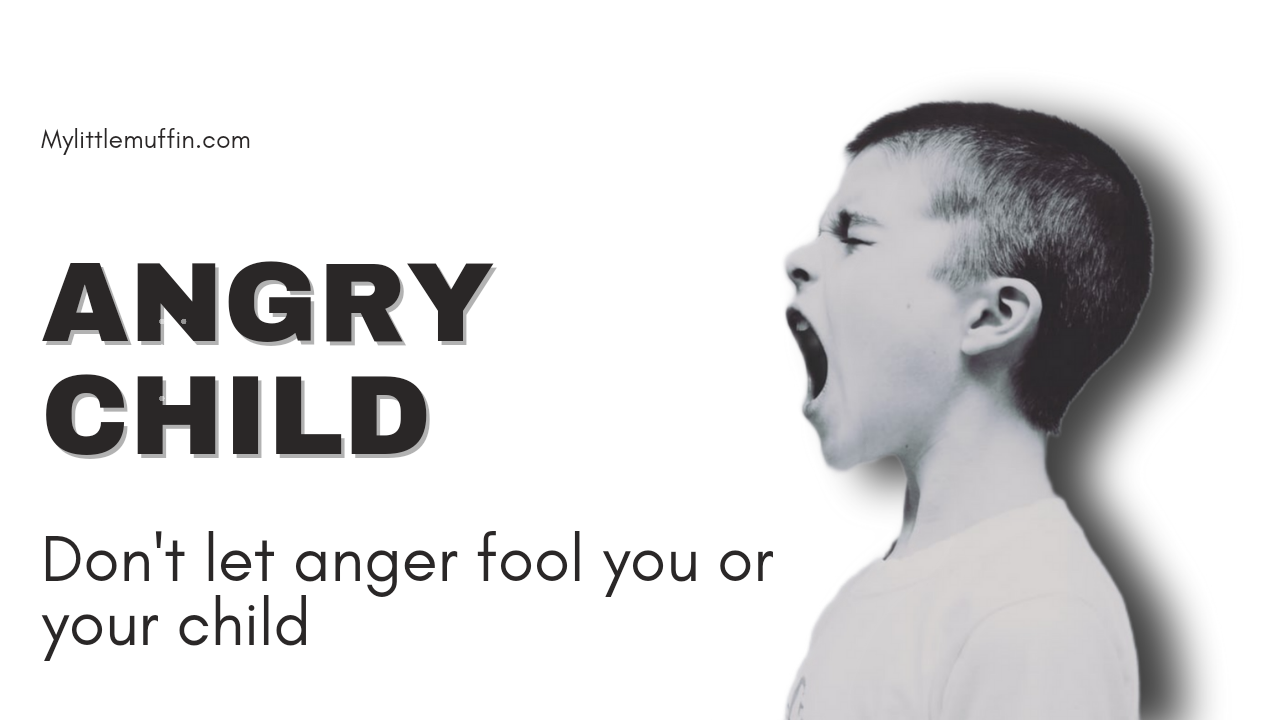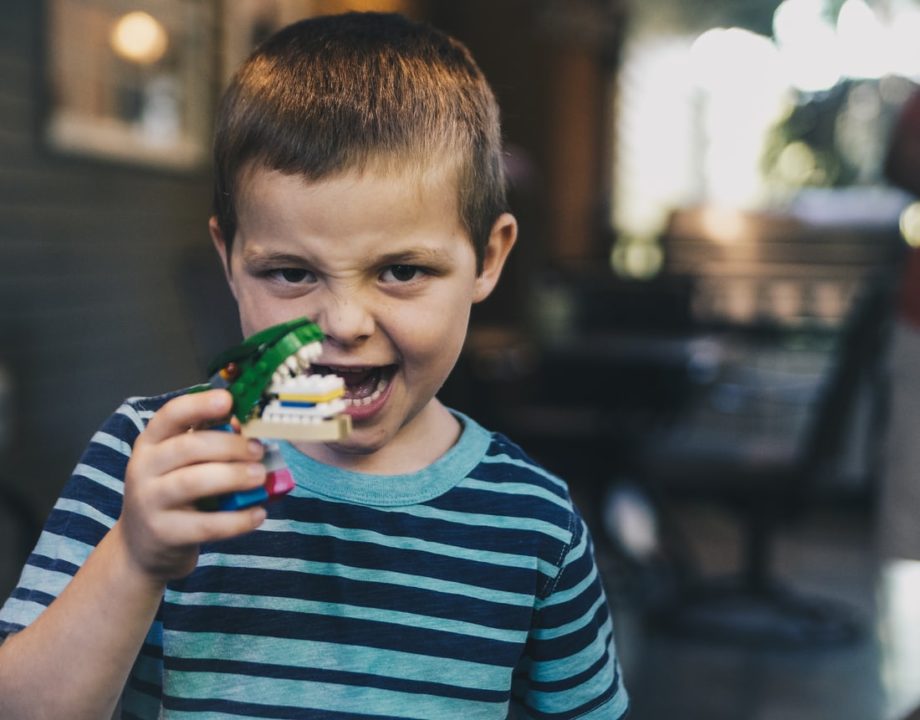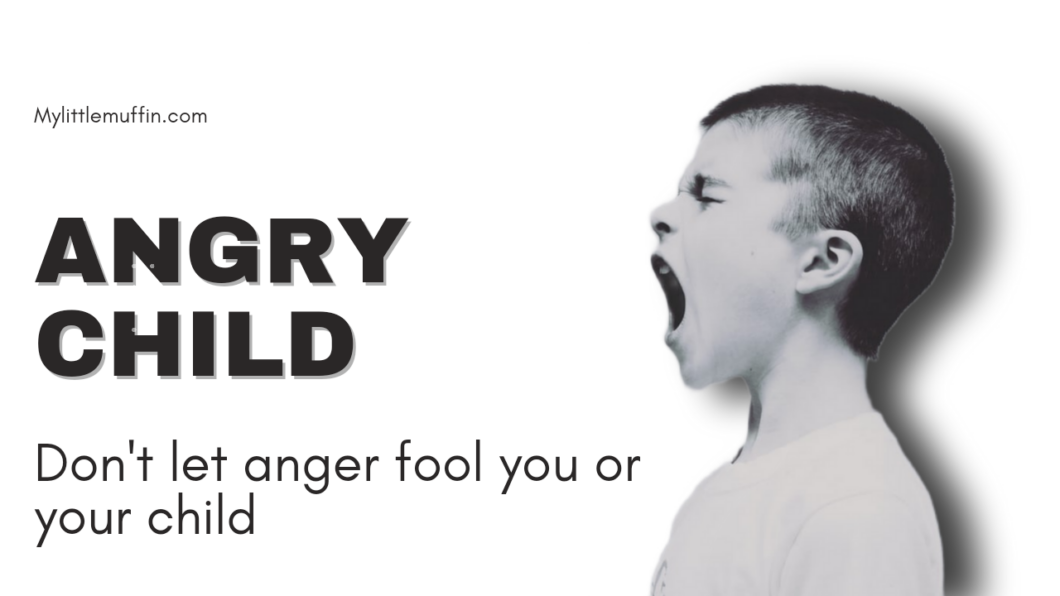Angry child :
Anger is a form of signal emotion that loves to trick us.
When I was a little kid, I felt that anger of people around me defined me. During my teenage days, my own anger made me feel strong, powerful and in control, and as a first time parent there were moments it gave me an illusion of a sense of control in the midst of all the confusion and chaos.

Soon enough I realised that how I felt back then weren’t my realities, but merely an illusion created by this strong emotion called ‘ Anger’, that in a way covered up some kind of discomfort, helplessness or hurt in me.
Anger successfully fooled me until I forcefully stared at it. That’s the impact it can have on us, if we don’t acknowledge Anger and don’t learn to regulate it.
As a mental health professional I have learnt that there is always much more to anger than what meets the eyes.
Anger mostly acts as a protective purpose for children, thus it’s important to not allow your child’s anger fool or misguide you. Take this opportunity to understand your child and bond with them better.

When your child is angry and says and does hurtful things, in reality they are feeling the most vulnerable, weak and fragile.
Please remember that Anger is an important part of a child’s development and growth.
Anger is not a bad emotion, instead is an important emotion for our survival.
An angry child isn’t being unreasonable, instead is trying to survive and cope the best they understand and know how at that instance.
We must understand that when a child struggles with anger, there is always an underlying reason behind it. We often are taken aback by their angry reaction, and end up neglecting or missing the real reason behind it.
How can a parent help an angry child?
The first and most important step in helping your child regulate their anger is to understand the hidden causes and addressing the actual root cause of this emotion.
Don’t let anger fool you or your child!
Get your curious hat on and try to find the struggles of your child. It’s best to look beyond the intense or aggressive behaviour.
I agree that it’s not possible to pin point the underlying cause of your child’s every anger outburst, however there are some common reasons why a child could be struggling to regulate anger in their daily life.

9 possible reasons why your child could be angry:
To decode this we must understand that apart from knowing what could have hurt our child physically, it’s vital to also consider their emotional struggles. Children from all age groups could end up dealing with anger issues at sometime, and if you as a parent are well equipped with the right kind of information, you could definitely help your child regulate anger in an effective way.
1. Need to be in control:
Like I mentioned before, anger often gives us an illusion of being in control and gives us a sense of power. A child, no matter in what age group, often ends up following others’ directives most of the time during the day. Due to busy and long hours of extra curricular activities and school, children are left nearly no time for child led activities which are important as these give children a healthy sense of power and helps them feel and become independent. In such a scenario expressing their anger is an easy and quick way for showing their powerlessness.
2. Huge life changes or transitions:
While transition and change are natural, so is the emotion that can come along with it – anger. For children, a routine change can disrupt their daily rhythm which can get them emotionally exhausted. When a child’s emotion centre is activated highly, they seem to lose control and end up expressing in disruptive anger.
3. Personality and temperament:
It’s a known fact that most of a child’s personality starts showing during the early days. Parents who are raising strong willed children are aware that some children are inherently less adaptive and flexible (which has it’s own benefits). Some kids who are quite sensitive and highly emotional inherently, end up working hard to manage their big emotions because of it’s intensity and frequency in their daily life.
4. Physical cause:
A child’s hunger, inadequate sleep, low blood sugar or other physical variables can play as an underlying reason for them not being able to regulate their anger. Please remember that a child’s mental health is directly linked with their physical state, which means small everyday physical changes could become a reason behind their anger. These could end up effecting their behavior and mood.
5. Disconnected:
A child has a natural and biological need to have a connected and warm relationship with the parent or caregiver. This is a powerful force in any child’s life, which provides them with a strong sense of belonging and security. This force helps a child to explore the world around with ease and helps in their healthy mental development. When this need of a child isn’t met, anger becomes an easy way for them to communicate or get attention from a parent or caregiver. They must feel being heard and seen else they would continue to express themselves with anger that they believe would help them get the attention they need.
6. Anxiety:
Anxiety in children pretty much looks like anger issues. A child who is anxious ends up getting angry frequently and more quickly. In this case it’s important to identify it right in time and get the required help.
7. Behavioral and emotional challenges:
If a child is born with Behavioral and emotional challenges, it will vastly affect how they manage and process anger. This condition is mostly recognizable from their early age and remains consistent throughout their childhood. Developmental conditions like ADHD, autism and sensory challenges are some of the conditions which effect a child’s emotional intelligence.
8. Modeling anger:
The kind of behavior a parent models in front of their child, effects how a child would regulate their own anger. If a parent’s behavior is controlled by their anger, the child picks up the same coping and regulating mechanism. It’s important for a parent to model healthy anger regulating mechanism. This will act as a powerful example for your child.
9. Learning disabilities or challenges:
An undiagnosed learning issue could lead to a child having difficulty in expressing emotions and could make them feel angry and frustrated. Often a child dealing with learning challenges isn’t able to meet the expectations of the world around and if it’s undiagnosed, it could become a chronic cycle of frustration, anger and stress.
Anger is indeed a natural and healthy emotion, however if we don’t help our children regulate it, it could cause the child enormous amount of stress and could effect the family as well. Explore the underlying causes as its important to not take anger at it’s face value. Understanding the cause would help you lead your child towards a healthy mental life and would help them have a healthy relationship with an important emotion- Anger.
Don’t let your child’s anger fool you.
You might feel helpless, out of control and hopeless and you might feel as if you are failing as a parent, but you must not forget the hard truth about anger.
Anger serves an important purpose in our life. It helps us in coping with difficult and challenging situations in life. But we must not allow it to call the shots.
Help your child have a healthy and friendly relationship with anger. And that will be possible only when we accept it and handle it in a confident and healthy way and not let it control us and our actions.
If your child is finding it difficult to have a healthy relationship with anger, please feel free to reach out to me. You can book one to one counseling sessions with me, where I would not just help your child regulate their anger, but would also provide them with tools that would help them have a healthy relationship with this important emotion. You can reach me at preetjyotkmehra@gmail.com or send me a message on my Instagram handle.
LOVE THIS? BE SURE TO SHARE!!
Read: Anxiety in kids – Part 1
Read: Bullying – Empower your Child
Read: Life Coach For kids who could help your kids reach their goals.
Read: Maternal anxiety – is for Real
Get on a discovery session With Life Coach Preet and discover new horizons. Reach me on Instagram to book one to one session or a group session.
Much love,
Preetjyot Kaur
??????????????? ?????????? ( ?????????) ????? ?????????? ??????????? EXPERT (???),???? ????? ??? ????, ????????? ????? & COACH FOR TEACHERS
If you found this post helpful or if you know of someone who could benefit from this, please go ahead and share this.
Feel free to personally contact me on my Instagram account or at preetjyotkmehra@gmail.com for any personal support.
Also, don’t forget to share your views in the comment section below .
